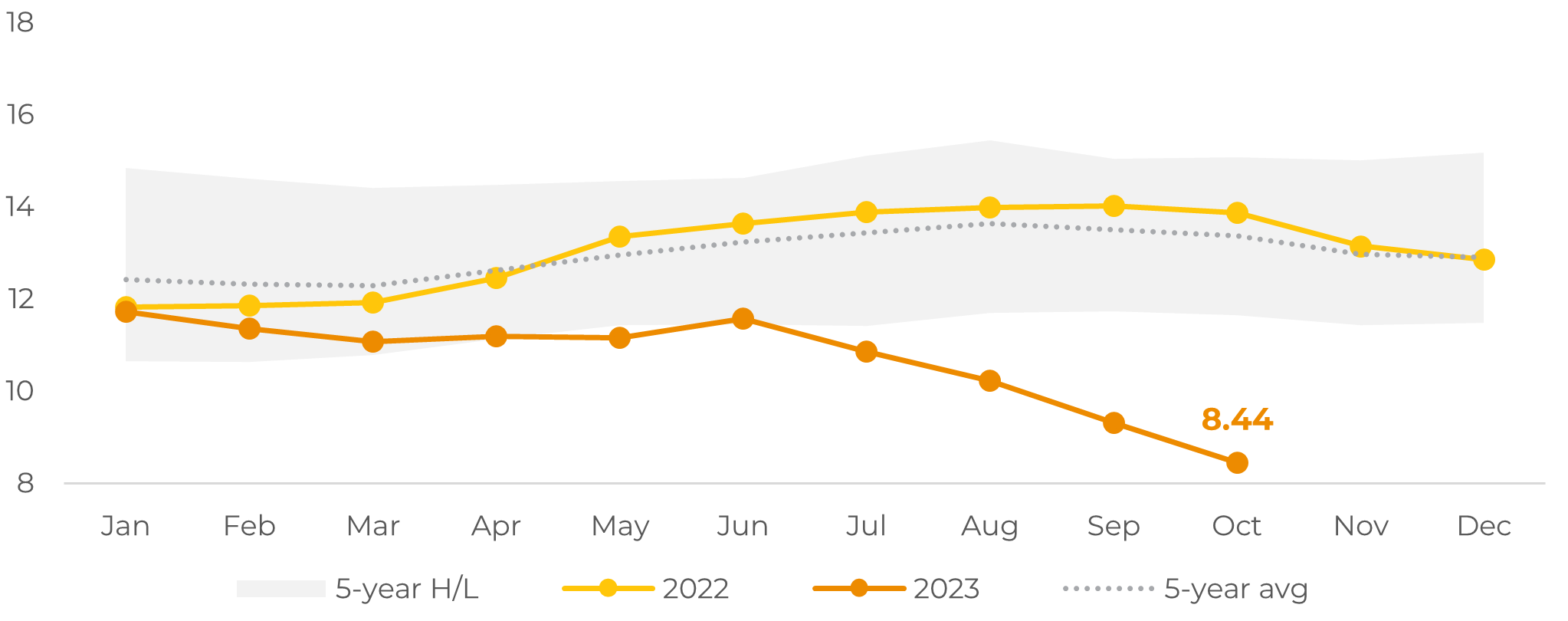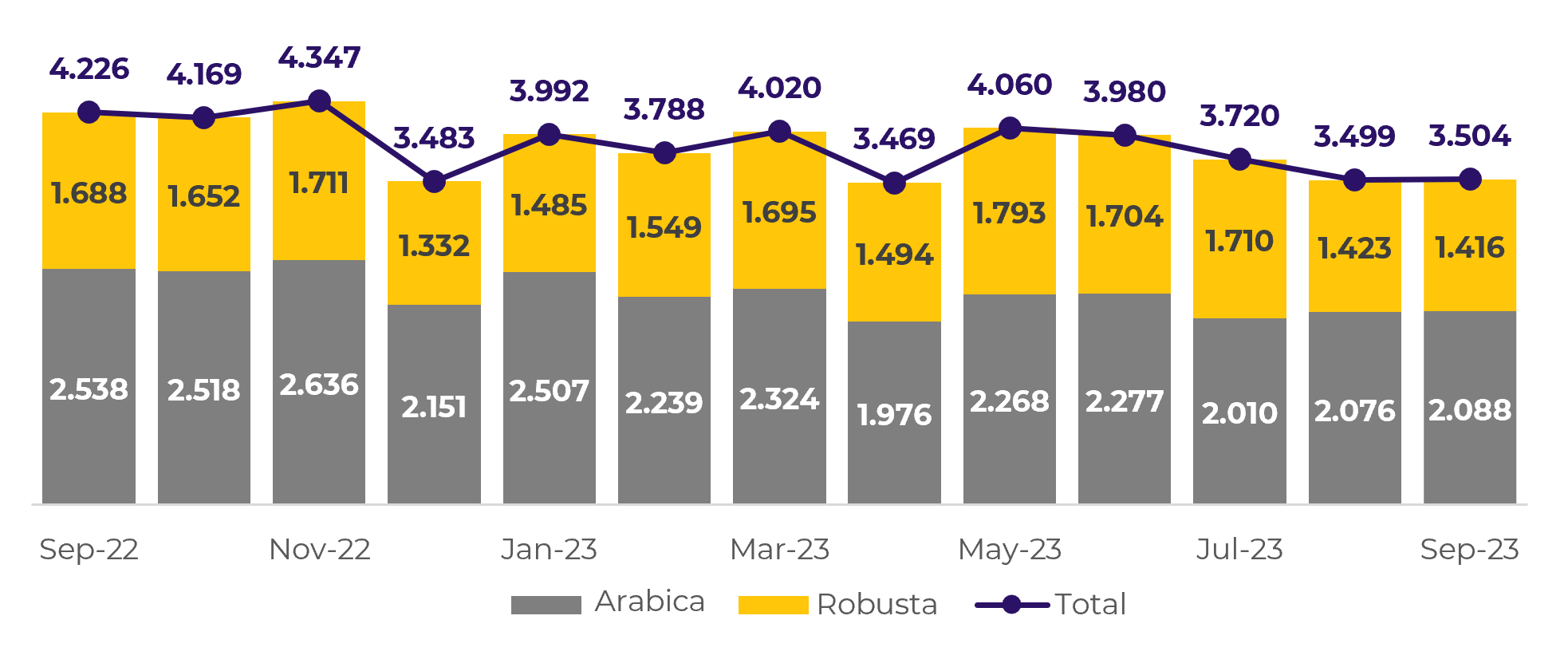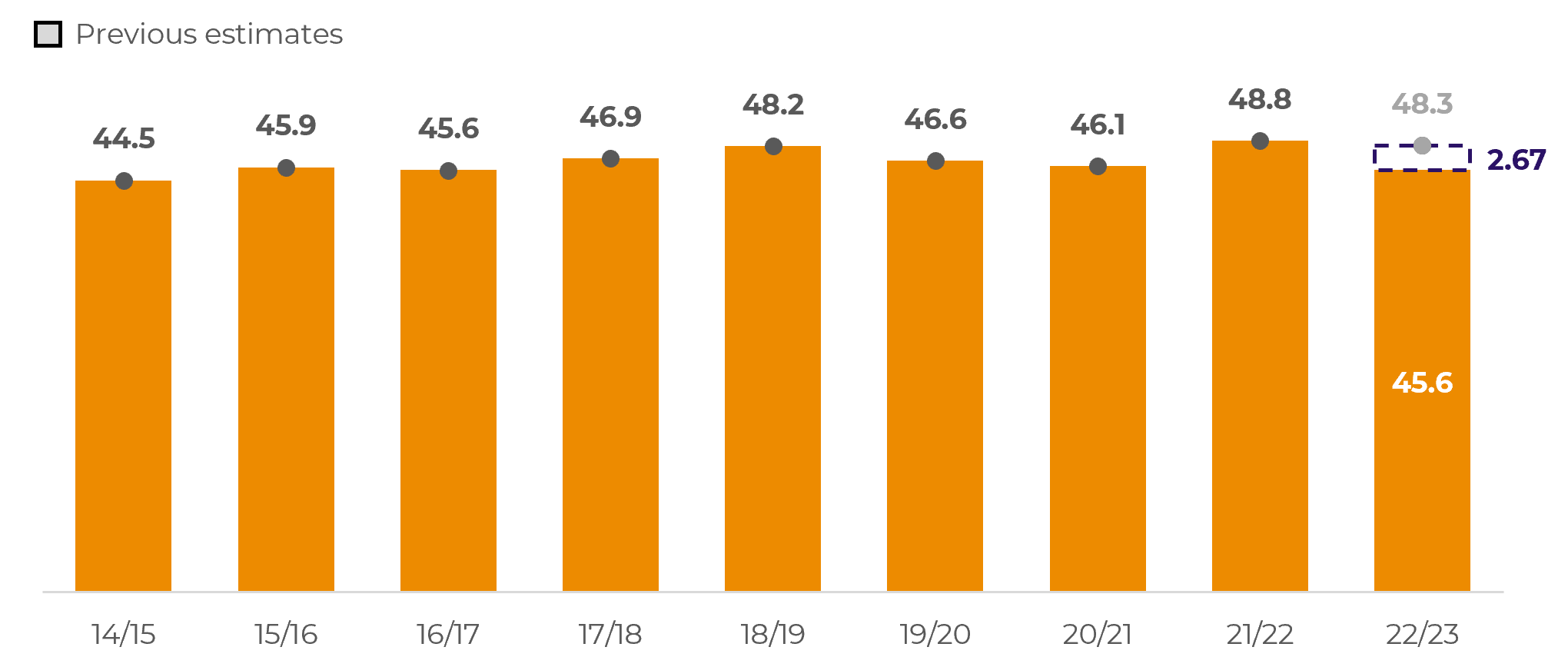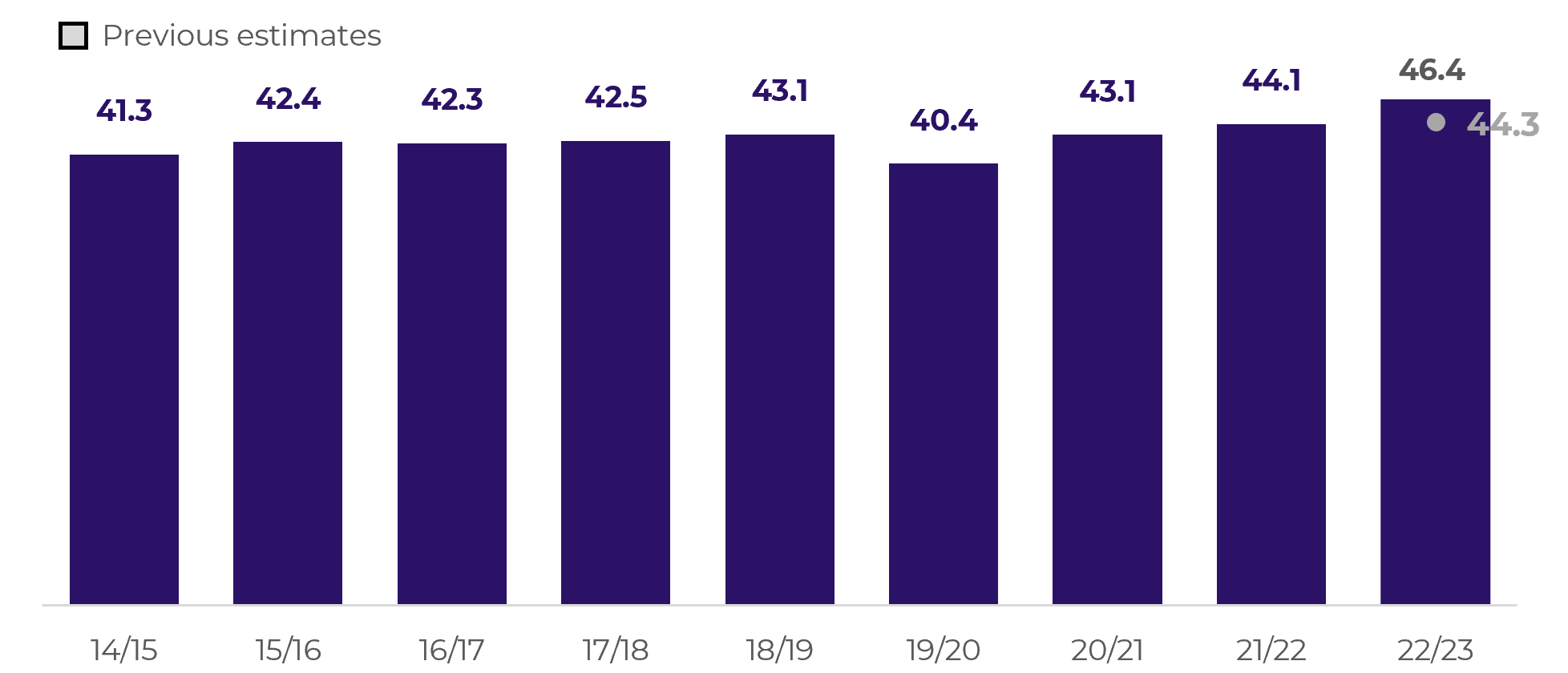
Nov 29
Coffee Weekly Report - 2023 11 29
Back to main blog page
- European coffee stocks for the 22/23 cycle hit historic lows in September and October. September stocks were 9.31M bags, and October stocks were 8.44M bags, the lowest since December 2013.
- Current stocks are 5M bags below average, covering only 18% of a year's demand, compared to 31% in October 2022. The drop is partly due to a 17% decrease in September 2023 imports (3.5M bags) and a lower stock-to-use ratio.
- For the entire crop year (October to September), the EU imported 45.6M bags, 7% less than the previous cycle. Despite lower imports, stocks fell by 40%, suggesting factors beyond imports contributed, including increased roaster demand.
- Roaster demand might be 5% higher than initial estimates, reaching 46.4M bags. Also, internal dynamics, such as anti-deforestation regulations, may also impact the coffee market in the European Union.
A look into European Union’s coffee demand
With the release of September and October European coffee stocks, 22/23 cycle results are finally at hand, and it’s an opportunity to review how demand has behaved in the EU – in order to understand how those indicators might develop in the upcoming year.
First, looking exclusively at the stocks data, both September and October results impress for their historical lows: stocks were at 9,31M bags in the former, and 8.44M bags in the latter (Chart #1) – the lowest since December 2013, when data is available.
Stocks are currently 5M bags below average, and in terms of stock-to-use ratio, the metric stacks up poorly when compared to last year: current stocks can meet 18% of a year’s worth of demand, while in October 2022, it could fill 31%!
The drop is partially explained simply by the lower imports figures: in September 2023, the bloc imported 3.5M bags, a 17% drop when compared to the same period last year (Chart #2). Lower stocks have been the norm at destinations for quite some time due to storage costs related to higher interest rates. Nonetheless, the last update draws attention for the historically low figures.
Image 1: European Union Coffee Stocks (M bags)

Source: ECF
Image 2: Monthly European Union Coffee Imports (M bags)

Source: Eurostat, hEDGEpoint
Looking at the crop year data (running from October to September), the European Union imported 45.6M bags, 2.67M bags lower than initial estimates for the period, which were at 48.3M bags (Chart #3).
It represents a 7% decrease when compared to the 21/22 cycle. Still, as discussed previously in the text, stocks dropped by roughly 5M bags during the same period (both YoY and vs. the historical average), a negative 40% change.
Therefore, the drop in stocks is only partially explained by lower imports: it’s also important to consider a possibly higher appetite by roasters, as well as internal dynamics particular to the bloc, since the same trend is not seen in other destinations (namely Japan, since United States stocks are no longer publicly available).
When considering the first case, it would suggest demand 5% higher than initial estimates (and also in the yearly comparison), reaching 46.4M bags, vs. the 44.3M bags projected figure, and 44.1M bags reported in the last cycle. As for the second case, new anti-deforestation regulations are also changing the landscape for commodity products in the bloc, including coffee – consequently, those particularities may also have an added impact.
Image 3: Yearly European Union Coffee Imports (M bags)

Source: Eurostat, hEDGEpoint
Image 4: Yearly European Union Coffee Apparent Consumption (M bags)

Source: Eurostat, ECF, hEDGEpoint
In Summary
The European coffee market for the 2022/2023 cycle reveals historically low stock levels in September and October, at 9.31M and 8.44M bags respectively, the lowest since December 2013. Current stocks, 5M bags below average, can only meet 18% of a year's demand, compared to 31% in October 2022.
The decline is attributed to a 17% drop in September 2023 imports, totaling 3.5M bags, and a 7% decrease in the overall 45.6M bags imported for the year. However, the 40% drop in stocks is not solely due to lower imports, as factors like increased roaster demand (potentially 5% higher than estimates) and internal dynamics, such as anti-deforestation regulations, may contribute to the decline.
Weekly Report — Coffee
Written by Natália Gandolphi
natalia.gandolphi@hedgepointglobal.com
natalia.gandolphi@hedgepointglobal.com
Reviewed by Pedro Schicchi
pedro.schicchi@hedgepointglobal.com
www.hedgepointglobal.com
Disclaimer
This document has been prepared by hEDGEpoint Global Markets LLC and its affiliates ("HPGM") exclusively for informational and instructional purposes, without the purpose of creating obligations or commitments with third parties, and is not intended to promote an offer, or solicitation of an offer, to sell or buy any securities or investment products. HPGM and its associates expressly disclaim any use of the information contained herein that may result in direct or indirect damage of any kind. If you have any questions that are not resolved in the first instance of contact with the client (client.services@hedgepointglobal.com), please contact our internal ombudsman channel (ouvidoria@hedgepointglobal.com) or 0800-878-8408 (for clients in Brazil only).
Contact us
hedgepointhub.support@hedgepointglobal.com
ouvidoria@hedgepointglobal.com
Funchal Street, 418, 18º floor - Vila Olímpia São Paulo, SP, Brasil
Check our general terms and important notices.
This page has been prepared by Hedgepoint Schweiz AG and its affiliates (“Hedgepoint”) solely for informational and instructional purposes, without the purpose of instituting obligations or commitments to third parties, nor is it intended to promote an offer, or solicitation of an offer of sale or purchase relating to any securities, commodities interests or investment products. Hedgepoint and its associates expressly disclaim any use of the information contained herein that directly or indirectly result in damages or damages of any kind. Information is obtained from sources which we believe to be reliable, but we do not warrant or guarantee the timeliness or accuracy of this information. The trading of commodities interests such as futures, options, and swaps involves substantial risk of loss and may not be suitable for all investors. You should carefully consider wither such trading is suitable for you in light of your financial condition. Past performance is not necessarily indicative of future results. Customers should rely on their own independent judgement and/or advisors before entering in any transaction.Hedgepoint does not provide legal, tax or accounting advice and you are responsible for seeking any such advice separately.Hedgepoint Schweiz AG is organized, incorporated, and existing under the laws of Switzerland, is filiated to ARIF, the Association Romande des Intermédiaires Financiers, which is a FINMA-authorized Self-Regulatory Organization. Hedgepoint Commodities LLC is organized, incorporated, and existing under the laws of the USA, and is authorized and regulated by the Commodity Futures Trading Commission (CFTC) and a member of the National Futures Association (NFA) to act as an Introducing Broker and Commodity Trading Advisor. HedgePoint Global Markets Limited is Regulated by the Dubai Financial Services Authority. The content is directed at Professional Clients and not Retail Clients. Hedgepoint Global Markets PTE. Ltd is organized, incorporated, and existing under the laws of Singapore, exempted from obtaining a financial services license as per the Second Schedule of the Securities and Futures (Licensing and Conduct of Business) Act, by the Monetary Authority of Singapore (MAS). Hedgepoint Global Markets DTVM Ltda. is authorized and regulated in Brazil by the Central Bank of Brazil (BCB) and the Brazilian Securities Commission (CVM). Hedgepoint Serviços Ltda. is organized, incorporated, and existing under the laws of Brazil. Hedgepoint Global Markets S.A. is organized, incorporated, and existing under the laws of Uruguay. In case of questions not resolved by the first instance of customer contact (client.services@Hedgepointglobal.com), please contact internal ombudsman channel (ombudsman@hedgepointglobal.com – global or ouvidoria@hedgepointglobal.com – Brazil only) or call 0800-8788408 (Brazil only).Integrity, ethics, and transparency are values that guide our culture. To further strengthen our practices, Hedgepoint has a whistleblower channel for employees and third-parties by e-mail ethicline@hedgepointglobal.com or forms Ethic Line – Hedgepoint Global Markets.Security note: All contacts with customers and partners are conducted exclusively through our domain @hedgepointglobal.com. Do not accept any information, bills, statements or requests from different domains and pay special attention to any variations in letters or spelling, as they may indicate a fraudulent situation.“HedgePoint” and the “HedgePoint” logo are marks for the exclusive use of HedgePoint and/or its affiliates. Use or reproduction is prohibited, unless expressly authorized by HedgePoint. Furthermore, the use of any other marks in this document has been authorized for identification purposes only. It does not, therefore, imply any rights of HedgePoint in these marks or imply endorsement, association or seal by the owners of these marks with HedgePoint or its affiliates.
We have updated our Terms & Conditions to reflect improvements to our platform, data handling practices, and the overall experience we provide to our clients.
To continue using the Hedgepoint HUB, please review and accept the updated terms.

